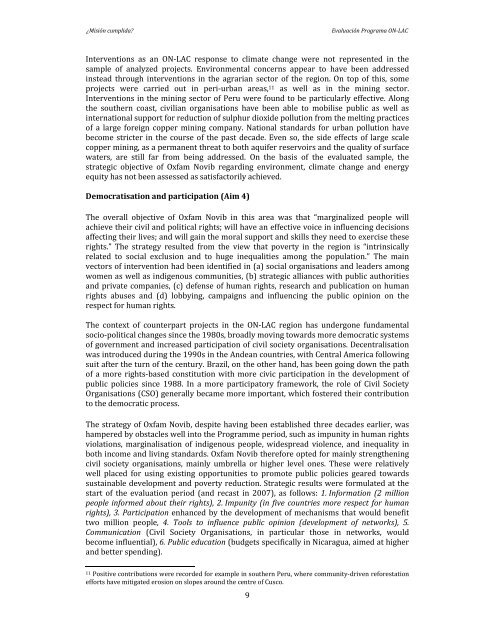¿MISION CUMPLIDA? EVALUACIÓN DEL PROGRAMA DE ... - Novib
¿MISION CUMPLIDA? EVALUACIÓN DEL PROGRAMA DE ... - Novib
¿MISION CUMPLIDA? EVALUACIÓN DEL PROGRAMA DE ... - Novib
You also want an ePaper? Increase the reach of your titles
YUMPU automatically turns print PDFs into web optimized ePapers that Google loves.
¿Misión cumplida? Evaluación Programa ON-LAC<br />
Interventions as an ON-LAC response to climate change were not represented in the<br />
sample of analyzed projects. Environmental concerns appear to have been addressed<br />
instead through interventions in the agrarian sector of the region. On top of this, some<br />
projects were carried out in peri-urban areas, 11 as well as in the mining sector.<br />
Interventions in the mining sector of Peru were found to be particularly effective. Along<br />
the southern coast, civilian organisations have been able to mobilise public as well as<br />
international support for reduction of sulphur dioxide pollution from the melting practices<br />
of a large foreign copper mining company. National standards for urban pollution have<br />
become stricter in the course of the past decade. Even so, the side effects of large scale<br />
copper mining, as a permanent threat to both aquifer reservoirs and the quality of surface<br />
waters, are still far from being addressed. On the basis of the evaluated sample, the<br />
strategic objective of Oxfam <strong>Novib</strong> regarding environment, climate change and energy<br />
equity has not been assessed as satisfactorily achieved.<br />
Democratisation and participation (Aim 4)<br />
The overall objective of Oxfam <strong>Novib</strong> in this area was that “marginalized people will<br />
achieve their civil and political rights; will have an effective voice in influencing decisions<br />
affecting their lives; and will gain the moral support and skills they need to exercise these<br />
rights.” The strategy resulted from the view that poverty in the region is “intrinsically<br />
related to social exclusion and to huge inequalities among the population.” The main<br />
vectors of intervention had been identified in (a) social organisations and leaders among<br />
women as well as indigenous communities, (b) strategic alliances with public authorities<br />
and private companies, (c) defense of human rights, research and publication on human<br />
rights abuses and (d) lobbying, campaigns and influencing the public opinion on the<br />
respect for human rights.<br />
The context of counterpart projects in the ON-LAC region has undergone fundamental<br />
socio-political changes since the 1980s, broadly moving towards more democratic systems<br />
of government and increased participation of civil society organisations. Decentralisation<br />
was introduced during the 1990s in the Andean countries, with Central America following<br />
suit after the turn of the century. Brazil, on the other hand, has been going down the path<br />
of a more rights-based constitution with more civic participation in the development of<br />
public policies since 1988. In a more participatory framework, the role of Civil Society<br />
Organisations (CSO) generally became more important, which fostered their contribution<br />
to the democratic process.<br />
The strategy of Oxfam <strong>Novib</strong>, despite having been established three decades earlier, was<br />
hampered by obstacles well into the Programme period, such as impunity in human rights<br />
violations, marginalisation of indigenous people, widespread violence, and inequality in<br />
both income and living standards. Oxfam <strong>Novib</strong> therefore opted for mainly strengthening<br />
civil society organisations, mainly umbrella or higher level ones. These were relatively<br />
well placed for using existing opportunities to promote public policies geared towards<br />
sustainable development and poverty reduction. Strategic results were formulated at the<br />
start of the evaluation period (and recast in 2007), as follows: 1. Information (2 million<br />
people informed about their rights), 2. Impunity (in five countries more respect for human<br />
rights), 3. Participation enhanced by the development of mechanisms that would benefit<br />
two million people, 4. Tools to influence public opinion (development of networks), 5.<br />
Communication (Civil Society Organisations, in particular those in networks, would<br />
become influential), 6. Public education (budgets specifically in Nicaragua, aimed at higher<br />
and better spending).<br />
11 Positive contributions were recorded for example in southern Peru, where community-driven reforestation<br />
efforts have mitigated erosion on slopes around the centre of Cusco.<br />
9



